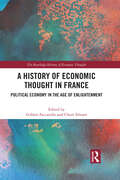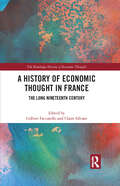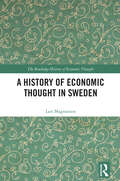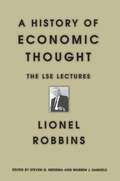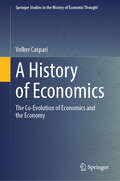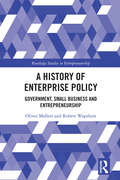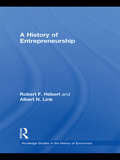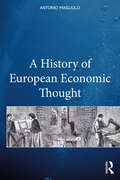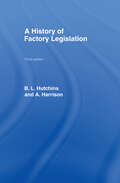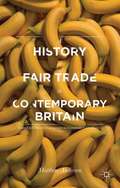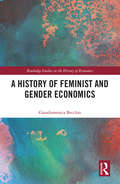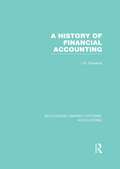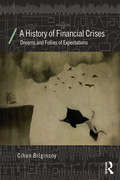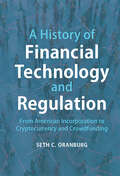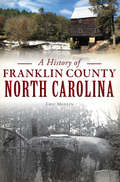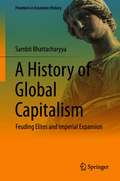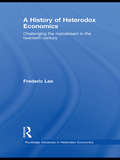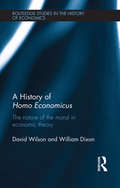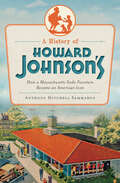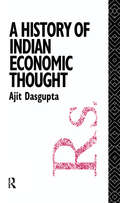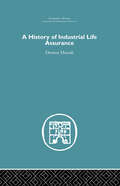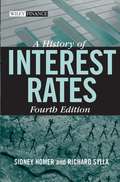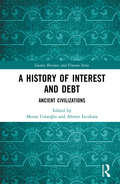- Table View
- List View
A History of Economic Thought in France: Political Economy in the Age of Enlightenment (The Routledge History of Economic Thought)
by Gilbert Faccarello Claire SilvantTraditionally, there has been a long and sustained interest in studying the history of economic ideas in France. Interest appeared to wane after World War II, but in recent decades, there has been a marked renaissance of interest and research in the contributions of French-speaking authors. Drawing on the flow of recent research, this book presents a new assessment of the history of political economy in France incorporating both novel presentations of some traditional subjects and topics that are not usually studied. This first volume deals with the history of political economy in France in the Age of Enlightenment. After presenting a kind of “review of the troops” and some main developments inherited from preceding centuries, the chapters are devoted to P. de Boisguilbert’s foundation of liberal political economy; J. Law’s monetary theory and policy; the many strands of “commerce politique”; the theoretical developments of F. Quesnay and the physiocratic movement; and A.-R.-J. Turgot’s, J.-J.-L. Graslin’s and M.-J.-A.-N. Caritat de Condorcet’s sensationist political economy. The volume then examines some political critiques of liberal political economy and goes on with a study of the first attempts to quantify economic variables and to formalise the economic discourse. It concludes with a chapter on the importance of translations into French of books published abroad, and with the main institutional and theoretical developments which happened during the French Revolution. A History of Economic Thought in France will be invaluable reading for advanced students and researchers of the history of economic thought, political economy, intellectual history and French history.
A History of Economic Thought in France: The Long Nineteenth Century (The Routledge History of Economic Thought)
by Gilbert Faccarello Claire SilvantTraditionally, there has been a long and sustained interest in studying the history of economic ideas in France. Interest appeared to wane after World War II, but in recent decades, there has been a marked renaissance of interest and research in the contributions of French-speaking authors. Drawing on the flow of recent research, this book presents a new assessment of the history of political economy in France incorporating both novel presentations of some traditional subjects and topics that are not usually studied. This second volume analyses the evolution of political economy during the long nineteenth century, combining an assessment of both liberals and their opponents. Its first part covers the most outstanding contributions to political economy in the age of industry, from the founding fathers (L.-C.-C. Destutt de Tracy and J. –B. Say) until the pre-World War I period, including that of A.-A. Cournot, J. Dupuit, the French liberal economists, and L. Walras. The volume then outlines the critiques of liberal political economy, focusing on the analyses of J.-C.L.S. de Sismondi, C.-H. de Saint-Simon and his followers, and the successive generations of socialist and associationist authors, not forgetting the sociological critique. A substantial postlude concludes the volume with a survey of recent developments of French economic thought up to the present day. A History of Economic Thought in France will be invaluable reading for advanced students and researchers of the history of economic thought, political economy, intellectual history and French history.
A History of Economic Thought in Sweden (The Routledge History of Economic Thought)
by Lars MagnussonSituating key texts and writers in their proper historical context, this book presents a history of Swedish economic thinking from early modern times to the present day.Highlighting key elements of Swedish political, economic and social history allows the book to shed new light on important parts of the story including the development of neo-classical economics from the late 19th century - associated with leading names such as Knut Wicksell, Gustav Cassel and Eli Heckscher – and the rise of the so-called Stockholm school in the 1920´s and 30´s. But the book also goes back further to explore the Swedish economic literature of the 18th century, particularly its more “liberal” version of mercantilism and cameralism, as well as early modern and medieval developments. Throughout, the book emphasizes the unique nature of much of the economic thinking emanating from Sweden. Emulation and adaption of political economic thinking imported from abroad – primarily the UK, France and German speaking countries - is an important part of this story, but this is shown to be an active process which has resulted in great originality in Swedish economic thought.This book will be of interest to readers in the history of economic thought, economic history, the history of ideas and Swedish history.
A History of Economic Thought: The LSE Lectures
by Lionel RobbinsLionel Robbins's now famous lectures on the history of economic thought comprise one of the greatest accounts since World War II of the evolution of economic ideas. This volume represents the first time those lectures have been published. Lord Robbins (1898-1984) was a remarkably accomplished thinker, writer, and public figure. He made important contributions to economic theory, methodology, and policy analysis, directed the economic section of Winston Churchill's War Cabinet, and served as chairman of the Financial Times. As a historian of economic ideas, he ranks with Joseph Schumpeter and Jacob Viner as one of the foremost scholars of the century. These lectures, delivered at the London School of Economics between 1979 and 1981 and tape-recorded by Robbins's grandson, display his mastery of the intellectual history of economics, his infectious enthusiasm for the subject, and his eloquence and incisive wit. They cover a broad chronological range, beginning with Plato, Aristotle, and Aquinas, focusing extensively on Adam Smith, Thomas Malthus and the classicals, and finishing with a discussion of moderns and marginalists from Marx to Alfred Marshall. Robbins takes a varied and inclusive approach to intellectual history. As he says in his first lecture: "I shall go my own sweet way--sometimes talk about doctrine, sometimes talk about persons, sometimes talk about periods." The lectures are united by Robbins's conviction that it is impossible to understand adequately contemporary institutions and social sciences without understanding the ideas behind their development. Authoritative yet accessible, combining the immediacy of the spoken word with Robbins's exceptional talent for clear, well-organized exposition, this volume will be welcomed by anyone interested in the intellectual origins of the modern world.
A History of Economics: The Co-Evolution of Economics and the Economy (Springer Studies in the History of Economic Thought)
by Volker CaspariDiscover the captivating journey of the history of economic thought through the centuries with this comprehensive textbook. From the dawn of economic thought in ancient times to the emergence of modern economic theory in the twentieth century, this textbook reveals the evolution of ideas that have shaped our understanding of economics. Ideal for advanced bachelor's and master's students in economics and related social sciences, this engaging resource illuminates the historical context of economic thought and its impact on real-world developments. It examines influential schools of economic thought, addresses major theoretical challenges, and highlights fundamental innovations that have shaped the development of the discipline. The textbook explores a wide range of topics, including the economic philosophies of ancient civilizations and the Middle Ages, the influence of mercantilism and physiocracy, the profound contributions of Adam Smith, David Ricardo, and Karl Marx to classical political economy, the marginalist revolution and neoclassicism, German historical economics, the evolution of macroeconomics, the rise of Keynesianism, and the enduring relevance of institutional economics. This is a must-read for students and anyone curious about the history of economics and economic history.
A History of Enterprise Policy: Government, Small Business and Entrepreneurship (Routledge Studies in Entrepreneurship)
by Robert Wapshott Oliver MallettGovernments in developed and developing economies have increasingly turned to entrepreneurship and small businesses for economic growth, dynamism and economic and social inclusion. Policies seeking to encourage, support or otherwise influence these forms of economic activity are varied but virtually omnipresent, recommended by organisations such as the OECD and World Bank and implemented by governments of many political ideologies. With a range of activities across government labelled as enterprise policy, it is vital to unpick the different policies, initiatives and interventions and to understand their development in order to subject them to scrutiny and evaluate the actions taken in the name of enterprise. This book provides the first in-depth, historical analysis of enterprise policy in the United Kingdom. Successive UK governments have been particularly active, with the number of initiatives estimated recently at 3000 and expenditure reaching as high as £12bn, yet facing continuous criticisms for its use, value or relevance. This historical study of UK enterprise policy represents a case study of different forms of enterprise policy and how they have developed, or failed to develop, over time, contributing to understanding of government, small business and entrepreneurship. It will be of value to researchers, academics, policymakers, and students interested in the history of small business and entrepreneurship as well as standing as a history of a specific policy area and the ways in which policies involving many different areas of government develop over time.
A History of Entrepreneurship (Routledge Studies in the History of Economics)
by Albert N. Link Robert F HébertThis book establishes a chronological trace of the entrepreneur as treated in economic literature in order to give a more wholesome perspective to contemporary writings and teachings on entrepreneurship. It focuses on the nature and role of the entrepreneur, and of entrepreneurship, as revealed in economic literature as early as the eighteenth century, when Richard Cantillon first coined the term 'entrepreneur'. The authors then trace how Joseph Schumpeter's perspective, among other’s, on entrepreneurship came to dominate the world's understanding of the term. Due to Schumpeter’s dominant influence, entrepreneurship has come to occupy a primary role in the theory of economic development. In this book Hébert and Link discuss various key topics including the German Tradition, the Austrian and the English School of thought as well as individuals such as Alfred Marshall and Jeremy Bentham. The historical survey also illustrates the tension that often exists between "theory" and "practice" and how it has been difficult for economic theory to assimilate a core concept that plays a vital role in social and economic change. Finally, the book exposes the many different facets of entrepreneurship as they have been perceived by some of the great economists throughout the ages.
A History of European Economic Thought
by Antonio MagliuloA History of European Economic Thought grafts the history of economic thought onto Global History by showing how significant economic ideas have influenced the process of Europe’s formation from the very beginning to the present day. This work combines two classical stories that until today have followed parallel paths. On the one hand, there is the political history of Europe, which is often limited to a few fleeting references to the ideas of the great economists of the past. On the other hand, there is the history of economic thought, which examines Europe as a whole, as a distinct supranational community, only with reference to the institutions created after World War II. The volume sheds light on the constitutive values of Europe, which also stem from a particular economic culture, and provides essential reading for students and scholars of the history of economic thought.
A History of Factory Legislation
by Amy Harrison B. Leigh HutchinsFirst Published in 1966. Routledge is an imprint of Taylor & Francis, an informa company.
A History of Fair Trade in Contemporary Britain: From Civil Society Campaigns To Corporate Compliance
by Matthew AndersonThis book offers an original contribution to the empirical knowledge of the development of Fair Trade that goes beyond the anecdotal accounts to challenge and analyse the trading practices that shaped the Fair Trade model. Fair Trade represented a new approach to global trade, corporate social responsibility and consumer politics.
A History of Feminist and Gender Economics (Routledge Studies in the History of Economics)
by Giandomenica BecchioThis book offers a historical exploration of the genesis of feminist economics and gender economics, as well as their theoretical and methodological differences. Its narrative also serves to embed both within a broader cultural context. Although both feminist economics and gender neoclassical economics belong to the cultural process related to the central role of the political economy in promoting women’s emancipation and empowerment, they differ in many aspects. Feminist economics, mainly influenced by women’s studies and feminism, rejected neoclassical economics, while gender neoclassical economics, mainly influenced by home economics and the new home economics, adopted the neoclassical economics’ approach to gender issues. The book includes diverse case studies, which also highlight the continuity between the story of women’s emancipation and the more recent developments of feminist and gender studies. This volume will be of great interest to researchers and academia in the fields of feminist economics, gender studies, and the history of economic thought.
A History of Financial Accounting (Routledge Library Editions: Accounting)
by J. R. EdwardsThis volume deals with the evolution of accounting from earliest times, and gives particular attention to corporate accounting developments since the Industrial Revolution. The author identifies the various sources of accounting practices employed by British companies, to demonstrate the main changes which have taken place, when they occurred and why. The author emphasises the need to understand the legal, social and economic context in which accountancy changes take place, and also studies the conflicts which arise between suppliers and users of accounting statements. The study concludes with an examination of the duties performed by the professional accountant, the extent to which these have changed in the course of time and how his position in society is reinforced by the activities of professional institutions.
A History of Financial Crises: Dreams and Follies of Expectations (Economics as Social Theory)
by Cihan Bilginsoy"Once-in-a-lifetime" financial crises have been a recurrent part of life in the last three decades. It is no longer possible to dismiss or ignore them as aberrations in an otherwise well-functioning system. Nor are they peculiar to recent times. Going back in history, asset price bubbles and bank-runs have been an endemic feature of the capitalist system over the last four centuries. The historical record offers a treasure trove of experience that may shed light on how and why financial crises happen and what can be done to avoid them - provided we are willing to learn from history. This book interweaves historical accounts with competing economic crisis theories and reveals why commentaries are often contradictory. First, it presents a series of episodes from tulip mania in the 17th century to the subprime mortgage meltdown. In order to tease out their commonalities and differences, it describes political, economic, and social backgrounds, identifies the primary actors and institutions, and explores the mechanisms behind the asset price bubbles, crashes, and bank-runs. Second, it starts with basic economic concepts and builds five competing theoretical approaches to understanding financial crises. Competing theoretical standpoints offer different interpretations of the same event, and draw dissimilar policy implications. This book analyses divergent interpretations of the historical record in relation to how markets function, the significance of market imperfections, economic decision-making process, the role of the government, and evolutionary dynamics of the capitalist system. Its diverse theoretical and historical content of this book complements economics, history and political science curriculum.
A History of Financial Technology and Regulation: From American Incorporation to Cryptocurrency and Crowdfunding
by Seth C. OranburgUsing the lens of history, A History of Financial Technology and Regulation illuminates recent changes to the world of finance. With lucid prose and the help of concrete examples, Seth Oranburg helps readers understand the role of technology in finance today, including complex phenomena such as mutual funds, cryptocurrencies, and the stock market itself. Chapters begin with basic principles and historical analogy before describing complex digital-investment strategies and instruments. Readers will also gain an introduction to key concepts in financial regulation, learning how law and regulations prevented some financial crises while perpetuating others. Oranburg concludes with ideas about what's next for finance and how the law should respond. This book will appeal to specialists and nonspecialists alike who are interesting in learning more about business, economics, finance, law, and regulation.
A History of Franklin County, North Carolina (Brief History)
by Eric MedlinThe story of Franklin County is one of remarkable change and growth over the past 250 years. From its Native American roots, this corner of the eastern Piedmont has become a center for tobacco plantations, textile mills and cotton cultivation. It has seen seminal moments in the history of public education, Methodism and even capital punishment. One governor called Louisburg home, while several more have visited and even presidents have made brief stops. Local historian Eric Medlin narrates the history of one of the most exceptional parts of the great state of North Carolina.
A History of Global Capitalism: Feuding Elites and Imperial Expansion (Frontiers in Economic History)
by Sambit BhattacharyyaThe book sets out to explore the economic motivations of imperial expansion under capitalism. This undoubtedly is related to two fundamental research questions in economic sciences. First, what factors explain the divergence in living standards across countries under the capitalist economic system? Second, what ensures internal and external stability of the capitalist economic system? The book adopts a unified approach to address these questions. Using the standard growth model it shows that improvements in living standards are dependent on access to raw materials, labour, capital, technology, and perhaps most importantly 'economies of scale'. Empires ensure scale economy through guaranteed access to markets and raw materials. The stability of the system depends on growth and distribution and it is not possible to have one without the other. However, the quest for growth and imperial expansion implies that one empire invariably comes into conflict with another. This is perhaps the most unstable and potentially dangerous characteristic of the capitalist system. Using extensive historical accounts the book shows that this inherent tension can be best managed by acknowledging mutual spheres of influence within the international system along the lines of the 1815 Vienna Congress. This timely publication addresses not only students and scholars of economics, geography, political science, and history, but also general readers interested in a better understanding of economic development, international relations, and the history of global capitalism.
A History of Heterodox Economics: Challenging the mainstream in the twentieth century (Routledge Advances in Heterodox Economics)
by Frederic LeeEconomics is a contested academic discipline between neoclassical economics and a collection of alternative approaches, such as Marxism-radical economics, Institutional economics, Post Keynesian economics, and others, that can collectively be called heterodox economics. Because of the dominance of neoclassical economics, the existence of the alternative approaches is generally not known. This book is concerned with the community history of heterodox economics, seen primarily through the eyes of Marxian-radical economics and Post Keynesian economics. Throughout the 20th century neoclassical economists in conjunction with state and university power have attacked heterodox economists and tried to cleanse them from the academy. Professor Lee, his groundbreaking new title discusses issues including the contested landscape of American economics in the 1970s, the emergence and establishment of Post Keynesian economics in the US and the development of heterodox economics in Britain from 1970 to 1996.
A History of Homo Economicus: The Nature of the Moral in Economic Theory (Routledge Studies In The History Of Economics Ser. #141)
by David Wilson William DixonA key issue in economic discourse today is the relation (or lack of it) between economic behaviour and morality. Few (presumably) would want to deny that human beings are in some sense moral or ethical creatures, but the devil is in the detail. Should we think of economic behaviour as an essentially amoral process – a process adequately characterised by a means-ends rationality – into which any number of subjective ethical concerns or orientations may be intruded to give a particular action its determinate moral content? Or is it rather the case that our moral being runs deeper than this, in the sense that all of our behaviour – ‘economic’ or otherwise – is enabled or capacitated by a competence that is fundamentally ethical in character? With new analyses of the work of Hobbes and Smith, Dixon and Wilson offer a fresh approach to the debate surrounding economics and morality with a novel discussion of the self in economic theory. This book calls for a change in the way that the relation between economic behaviour and morality is understood – from an understanding of morality as a kind of preference that informs certain types of other-regarding behaviour (the way that modern economics understands the relationship), to an idea of morality as a competence that enables or, rather, conditions the possibility of all forms of human behaviour, other-regarding or not. Offering a new insight on homo economicus, this book will be of great interest to all those interested in the history of economics and of economic thought.
A History of Howard Johnson's: How a Massachusetts Soda Fountain Became an American Icon (American Palate Ser.)
by Anthony Mitchell SammarcoThe iconic restaurant chain that defined Americana by introducing twenty-eight flavors of ice cream, &“tendersweet&” clam strips, grilled &“frankforts,&” and more. Popularly known as the &“Father of the Franchise Industry,&” Howard Johnson delivered good food and fair prices—a winning combination that brought appreciative customers back for more. The attractive white Colonial Revival restaurants, with eye-catching porcelain tile roofs, illuminated cupolas, and sea blue shutters, were described in Reader&’s Digest in 1949 as the epitome of &“eating places that look like New England town meeting houses dressed up for Sunday.&” Learn how Johnson created an orange-roofed empire of ice cream stands and restaurants that stretched from Maine to Florida . . . then all the way across the country.
A History of Human Rights Society in Singapore: 1965-2015 (Politics in Asia)
by Jiyoung SongTo celebrate Singapore’s fiftieth anniversary for its independence from Malaysia in 2015, 35 students, academics and activists came together to discuss and write about pioneering Singaporean human rights activists and their under-reported stories in Singapore. The city-state is known for its remarkable economic success while having strict laws on individual freedom in the name of national security, public order and racial harmony. Singapore’s tough stance on human rights, however, does not negate the long and persistent existence of a human rights society that is little known to the world until today. This volume, composed of nine distinctive chapters, records a history of human rights activists, their campaigns, main contentions with the government, survival strategies and other untold stories in Singapore’s first 50 years of state-building.
A History of Indian Economic Thought (The Routledge History of Economic Thought)
by Ajit K. DasguptaThe history of Indian economic thought provides rich insights into both economic issues and the workings of the Indian mind. A History of Indian Economic Thought provides the first overview of economic thought in the sub-continent. Arguing that it would be inappropriate to rely on formal economic analyses it draws on a wide range of sources; epics, religious and moral texts for the early period and public speeches, addresses, and newspaper articles for controversies from the nineteenth century onwards. What emerges is a rich mosaic reflecting India's different cultures and civilizations. Hinduism, Buddhism and Islam all address economic issues and British colonial rule had a deep impact, both in propagating Western economic ideas and in provoking Indian theories of colonialism and underdevelopment. The author concludes with chapters on Ghandian economics and on Indian economic thought since Independence.
A History of Industrial Life Assurance
by D. MorrahFirst Published in 2005. Routledge is an imprint of Taylor & Francis, an informa company.
A History of Interest Rates
by Richard Sylla Sidney HomerA History of Interest Rates presents a very readable account of interest rate trends and lending practices over four millennia of economic history. Despite the paucity of data prior to the Industrial Revolution, authors Homer and Sylla provide a highly detailed analysis of money markets and borrowing practices in major economies. Underlying the analysis is their assertion that "the free market long-term rates of interest for any industrial nation, properly charted, provide a sort of fever chart of the economic and political health of that nation." Given the enormous volatility of rates in the 20th century, this implies we're living in age of political and economic excesses that are reflected in massive interest rate swings. Gain more insight into this assertion by ordering a copy of this book today.
A History of Interest and Debt: Ancient Civilizations (Islamic Business and Finance Series)
by Murat UstaoğluWith the spread of interest-based transactions, major problems such as inequality, poverty and debt-based slavery have emerged. Those who practiced professions such as usury have, despite the negative connotations attributed to them, contributed extensively to the construction of the conventional financial system in the global economy, suggesting that the core concepts in this practice need to be analyzed in greater depth and from a historical perspective. This book analyzes the evolution of interest-bearing debt transactions from ancient times to the era of Abrahamic religions. In modern times, interest is strictly prohibited by Islam, but this book demonstrates that it is a practice that has been condemned and legally and morally prohibited in other civilizations, long before Islam outlawed it. Exploring the roots of this prohibition and how interest has been justified as a viable practice in economic and financial transactions, the book offers deep insight into the current nature of finance and economics, and the distinctive features of Islamic finance in particular and enables researchers to further delve into a review of interest-free financing models. Islamic finance, or alternative financial methods, have become extremely popular particularly in the aftermath of global financial crises, suggesting that they will attract further interest in the future as well. The book is primarily aimed at undergraduate and graduate students but, as it avoids the use of technical jargon, it also speaks to a general readership. It will appeal to those who have an interest in financial history, particularly the history of debt as well.
A History of International Civil Aviation: From its Origins through Transformative Evolution
by Alan DobsonFor civil aviation to progress it has never been just about technology and business practices. To go from the rudiments of the early services that plied across short distances in Europe and America to what we experience today required most of all that politicians and policy-makers address the central problems of national sovereignty over air space and national ownership and control over airlines. Those problems have plagued the development of seamless and efficient air services for consumers in the international sphere. One would have thought that international airlines might have led the way towards a uniform globalized system given the nature of their enterprise, but that has definitely not been the case. Sovereignty and security issues have more often than not trumped commercial arguments for a more level playing field for international airlines. There has thus been an on-going tussle between sovereignty, state security and mercantilist practices on the one hand and the ambition for civil aviation to flourish on the other. As one early commentator put it:’ one is convinced that the sovereign state cannot be left without authority over what happens just above its territory, (but) … one shrinks from the idea that aerial navigation could be the object of narrow-minded restrictions.’ How those narrow-minded restrictions were gradually eroded, though still not eliminated, to enable civil aviation to flourish is at the heart of this work. This book will be of direct interest to students of aviation, modern history, international relations and transport. It is also of value to airline industry professionals and government transport departments.
